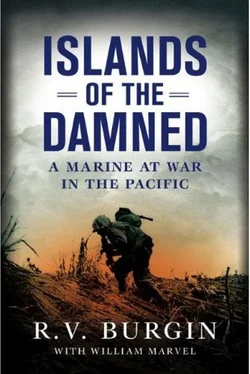Finally he stood and said something—I didn’t catch what—that pushed the MP over the edge.
“I want you to sit down, shut up and don’t be aggravating me anymore,” the MP snapped. “If you don’t sit down and shut up, I’m going to knock the hell out of you.”
The prisoner kept yacking and the MP got up, billy club in hand. There was a loud crack! and the guy went down with a couple bloody teeth in his lap. For the rest of the trip he sat bleeding into a handkerchief. But he didn’t say a thing.
The rest of that day word went up and down that coach among the recruits: “Yeah, you don’t argue with authority.”
Sometime around eight or nine o’clock the second night out the train pulled into boot camp. We were ordered out of the cars and told to stand with our toes touching a white line on the pavement and with our bags on our right. Then they read out our names and marched us to the barracks.
We couldn’t see a thing in the darkness. That’s the way they always tried to do it with recruits, bring you in at night. You’re disoriented, you can’t get your bearings, you don’t know what’s coming. They’re in charge.
I was apprehensive, but I wasn’t scared. I didn’t think they could dish out anything that I couldn’t handle.
Bunks were double stacked along both walls. Beside each bunk was a wooden chest, which we learned was our locker, and a galvanized pail. We’d find out what the pail was for the next morning. We were in our bunks before midnight. It seemed like I had just closed my eyes when they sounded reveille, right inside the door. And it was loud. The drill instructor was hollering, “Hit the deck, you bunch of sorry punks.”
And we did hit the decks. Guys were banging on the floor, metal bunks were rattling. For the next six weeks those were the sounds that started off every day, our alarm clock: reveille and clanging bunks and the DI shouting at us “punks.” We were never Marines. We were the sorriest bunch of human beings they’d ever set eyes on.
It must have been six a.m., still dark outside. I thought, What the hell have I got myself into?
We marched to the chow line and got breakfast. Then we were ordered to pick up our pails and follow the sergeant. Next everybody lined up for a haircut. In those days long hair was not the style, even if you weren’t in the Marines. But one kid did wear his hair curled and hanging down, like he was proud of it. The barber asked him, “Do you want to keep these curls?”
“Yes, sir, I sure do.”
“Okay,” the barber said. With his clippers he sheared up one side of that kid’s head and down the other. Then he handed the kid his locks. “Here, keep these.”
After haircuts, we went to the supply room, pails in hand, to draw our clothes—socks, shoes, underwear, dungarees. The recruits who had already been through the line were yelling at us, “You’ll be sorry.” The guys behind the counter handing out the clothes were giving us a hard time, too. You had to wear what they gave you. You didn’t go back and exchange it. There were only two sizes in the Marine Corps: too big and too damned big.
They did ask what size shoe you wore, so your shoes always fit good for marching. They were high-tops, maybe ankle length. The smooth side of the leather was on the inside, the rough side out. And every cotton-picking day you had to shine those shoes so the DI could see his face in them. By the end of boot camp, you had them gleaming like a new car. The brown polish came in a little tin they issued along with the clothes, shaving gear, toothpaste and toothbrush, and a bar of soap. It all went into the pail. We had to buy a copy of the little red book, the Marine’s Handbook , for $1. The 242-page “Seventh Edition.” Over the weeks ahead we’d just about memorize it. I think they took $10 out of our first month’s pay for the whole bucketful of goodies.
They told us to strip out of our street clothes, put them in a cardboard box, and write our home address on the outside of the box. That was the last we’d see of our street clothes. Then, with pails in hand, Marine uniforms over our left arms, shoes strung around our necks by their laces, they marched us buck naked back to the barracks. Here they gave us padlocks for our lockers. We drew two sheets, two Marine blankets and a pillowcase each. And we got our dog tags. There was a pair of them on the string, one hanging from the other. They were still brass in those days. Later they went to aluminum. Each was stamped with our name and military identification number. Mine was 496798. We were told the dog tags must remain around our necks at all times. They didn’t tell us then that if we died in combat, one of the dog tags would be sent to an office in Washington as a record of our death. The other would stay with our body and eventually hang from the cross over our grave.
We signed all sorts of papers, took some tests, got our shots.
We learned that Marines had their own name for everything. The floors were the deck. The walls were bulkheads, the ceiling was the overhead, stairs were ladders. The bathroom was the head, and was to be kept spotless at all times. We were not to leave the barracks unless we had permission. We were taught how to make up the bunks and how to stow our gear in the lockers. You had to get down on your hands and knees to open them because the key was on the same string as your dog tags, and we were forbidden to take that string off. There was a place for everything and everything had to be in its place.
Two corporals took charge of sixty of us. They were our DIs, and they were to be obeyed. When one of them entered the squad room, whoever saw him first yelled “Attention!” and we all snapped to.
Our rifles were issued a few days later. The M1903 Springfield weighed eight pounds and eleven ounces. We did physical drill every day, and we’d stand holding that heavy rifle at arm’s length, shoulder high—and hold it and hold it. When they got through with us, our arms were so tired that the rifle felt like it weighed eighty pounds.
We drilled with them, but we didn’t fire them yet.
One of the few times I got in trouble was over my rifle. During rifle inspection, you hold the weapon up and the DI grabs it and inspects it. I guess.
I hung on to mine a little too tight. At least that’s what he thought.
“Oh, you love that rifle, do you?” he said.
I said, “Yes, sir!”
Our DIs were corporals, but it was always “Yes, sir!” and “No, sir!”
“Okay, you can sleep with it tonight,” he said. “You put that right in your bunk when you go to bed and you take it out when you get up in the morning. You sleep with that rifle tonight if you like it so well.”
“Yes, sir!”
Sure enough, sometime during the night—I don’t know exactly what time it was—he came around to check if that rifle was in the bunk with me. And it was there, right beside me.
We “dry fired” the rifle for days, practicing the same sequence over and over—align the sight, adjust for wind and distance, breath control, gentle trigger squeeze, follow-through—before we got to shoot live ammunition. On the range some of the guys couldn’t get their arm positioned where the instructor wanted it. When you’re shooting they want that arm squarely under that rifle, straight up and down. Some guys were just not flexible. They couldn’t bring their arm over that far. They had a helluva time. So the DI would take their arm and yank it— uh! —and finally get it where it belonged.
There were three rankings, from Marksman to Sharpshooter up to Expert: I shot Sharpshooter with the .45 pistol and Springfield.
They worked us day and night. They’d come into the barracks at eleven o’clock at night. You hadn’t been in bed maybe an hour, and they’d shout, “We’re moving out! We’re shipping overseas. Get it all together.” We had to get our seabag, our full transport pack, our shelter half, the whole nine yards. We’d hit the streets and they’d march us for an hour and a half. Then we’d come back and get a little sleep and maybe at three o’clock they’d get us up again. We did a lot of running in the sand, and if you weren’t in pretty good shape that was tough. Your foot was slipping back every time it hit the sand. It was like trying to run in one of those dreams where your feet move but you don’t get anywhere.
Читать дальше











